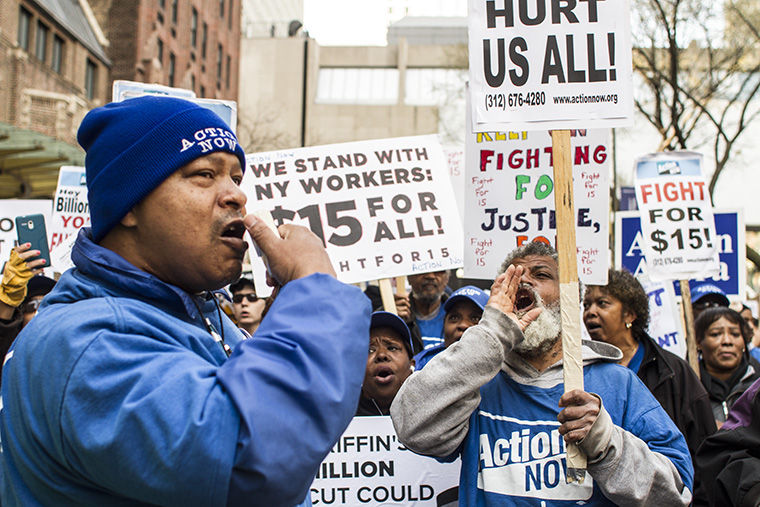Chicago workers fight for $15
Minimum wage employees and allies chanted outside the home of Ken Griffin, a wealthy global investment manager, at 800 N. Michigan Ave. on April 14. Protesters demanded that the minimum wage be increased to $15 an hour.
April 18, 2016
Minimum wage workers and their supporters rallied in the South Loop on April 14, in tandem with nationwide protests calling for both a $15 minimum hourly wage and union rights.
Hundreds gathered in the afternoon at 800 N. Michigan Ave., beneath the penthouse of Illinois’ wealthiest resident, Ken Griffin, founder and CEO of global investment firm Citadel. One supporter held a sign depicting the McDonald’s golden arches and the slogan “leading the race to the bottom.”
“I have four jobs, and I’m still not able to afford tuition to college; that’s why I’m here—because I see myself in the struggles of these people,” said Carolina Gallo, a student at the University of Chicago. “I think it’s important for people to take action and demand what they deserve; I think it’s time for people to talk about the injustices that are happening.”
Chicago’s minimum wage increased to $10 an hour last summer, as reported in a July 2015 online report from ABC7, but many at the April 14 protest insisted that the wage boost still fails to allow them to pay for college or support
their families.
The protesters then marched to the Bank of America office at 515 N. LaSalle St. and continued marching to the McDonald’s located at 600 N. Clark St.
Angel Mitchell, a McDonald’s employee of three-and-a-half years and a recent graduate of the University of Illinois at Chicago, said she attended the rally because the protest made a statement about more than fast food workers.
“[We are] striking today because we’re making poverty wages [while working at] billion dollar companies and corporations,” Mitchell said. “Paying my student loans back—that’s going to be a problem come October.”
Mitchell said if Ken Griffin gets tax breaks, then she would like more tax breaks so she would not have to depend on public assistance like many fast food workers in Illinois do.
Many same-day rallies were organized nationwide April 14 in major cities in New York, Florida and California.
Lisa McComb, a spokeswoman for McDonald’s, said in an April 14 email that the company “proudly invests” in the future of its restaurant employees.
“In addition to raising the minimum wage for employees at our company-owned restaurants, we offer employees access to Archways to Opportunity, a set of programs McDonald’s pays for which help them earn a high school diploma and get needed tuition assistance so they can work toward earning a college degree,” McComb said.
Additionally, many parents like Lakesia Collins, a mother of three who works at Symphony at Midway, a long-term care facility at 4437 S. Cicero Ave., are struggling to support their families.
“It’s embarrassing [that] I started off thinking I would make a decent living wage because I was taking care of our most vulnerable people,” Collins said.
She said providing quality care is difficult because of working conditions and low-wage pay.
“I can’t give my sons their basic necessities because I’m paying bills [and] paying back loans I had to take out,” Collins added.
According to a Dec. 2, 2014 press release, the Chicago City Council passed an ordinance on the same date that will raise the minimum wage for Chicago workers to $13 per hour by 2019. The release also said the increase will inject $860 million into the local economy and get an estimated 70,000 workers out of poverty.
Although national attendance at the April 14 protests totaled in the thousands, there is substantial opposition to raising the minimum wage to $15 an hour.
A November 2015 article from the Employment Policies Institute cited a survey conducted by the University of New Hampshire that reportedly found that 72 percent of U.S. economists oppose a federal $15 minimum wage. About 83 percent believe a $15 minimum wage would have harmful effects on youth employment, and 76 percent said it would negatively impact job availability, the study said. The EPI is operated by restaurant and tobacco industry lobbyist Richard Berman.
A Facebook page called “Fight against $15,” gained 394 likes as of press time. The “About” section of the page reads: “Our country is already failing miserably in many areas where it once excelled. When we start giving people more money simply because they need or want and not because they earn or deserve it, we will do irreparable harm both ethically and economically.”
The page description also says that raising the minimum wage to $15 an hour would discourage people from pursuing an education and getting better jobs and would limit people from becoming “real adults” with careers and families.
George White, who previously worked in the dietary department of a Wicker Park nursing home but is currently between jobs, attended two of the many protests held on April 14 because he is personally affected by the status of the hourly minimum wage.
White acknowledged that a minimum wage increase could also be stalled by the state budget impasse but said he has a difficult time paying for any of his necessities. White said he has five adult children, two of whom he helps because they are unemployed.
He explained that he has had trouble paying both his electric and gas bills for the last 11 years, and that using public transportation is his only option to travel throughout the city because he cannot afford to buy a car. White added that he buys most of his clothing from affordable resale stores like Goodwill store and donation centers.
White said living on minimum wage makes it difficult to provide for his children, but he remains optimistic. “We make do, and we’re not going to give up,” he said.








